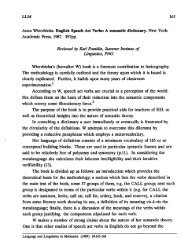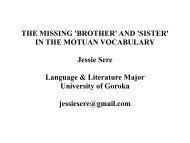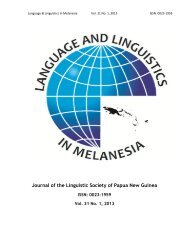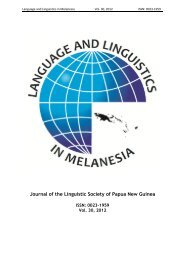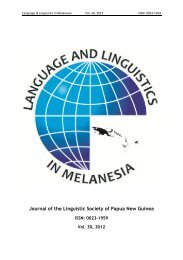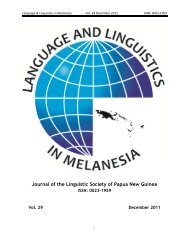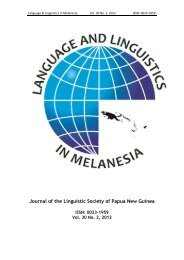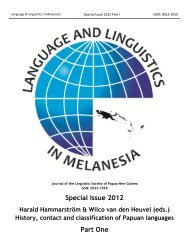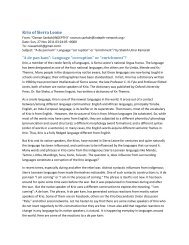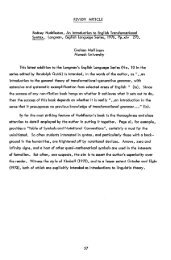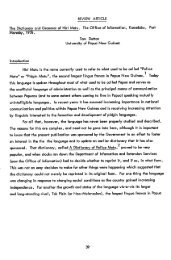Journal of the Linguistic Society of Papua New Guinea
Journal of the Linguistic Society of Papua New Guinea
Journal of the Linguistic Society of Papua New Guinea
You also want an ePaper? Increase the reach of your titles
YUMPU automatically turns print PDFs into web optimized ePapers that Google loves.
Language & <strong>Linguistic</strong>s in Melanesia Vol. 30 No. 2, 2012 ISSN: 0023-1959<br />
How different speakers use words or perceive <strong>the</strong><br />
relationships between words/ groups <strong>of</strong> words in <strong>the</strong><br />
sentence mosaic determines <strong>the</strong>ir functions in <strong>the</strong><br />
sentence and affects <strong>the</strong> overall meaning <strong>of</strong> <strong>the</strong><br />
sentence mosaic.<br />
FLEXIBILITY OF G-NALYSIS<br />
Because we all make sense <strong>of</strong> things in our own<br />
heads, people <strong>of</strong>ten ‘see’ <strong>the</strong> connections between<br />
words differently, making different ‘sense’ <strong>of</strong> <strong>the</strong><br />
same mosaic image. This tongue-in-cheek FB<br />
comment is an example <strong>of</strong> this kind <strong>of</strong> ambiguity:<br />
G-nalysis effectively represents different ‘visions’ <strong>of</strong><br />
connections between word-meanings and groups <strong>of</strong><br />
word-meanings in <strong>the</strong> sentence mosaic – moreover, G-nalysis encourages analytical thinking… So long<br />
as <strong>the</strong> relationships between words, phrases and clauses ‘make sense’ and are supported by <strong>the</strong> way <strong>the</strong><br />
words/groups <strong>of</strong> words answer <strong>the</strong> common-sense logical questions, <strong>the</strong>y are always a possibility, and<br />
students enjoy figuring out all <strong>the</strong> possible relationships between <strong>the</strong>m.<br />
In this case, <strong>the</strong> verbal noun phrase ‘be stoned’ can be interpreted as <strong>the</strong> infinitive <strong>of</strong> <strong>the</strong> passive verb or<br />
<strong>the</strong> infinitive <strong>of</strong> <strong>the</strong> stative verb ‘be’ + <strong>the</strong> past participle <strong>of</strong> ‘stone’ functioning as predicate adjective:<br />
S 1 V 1 C 1(IO) S 2 V 2 C 2 (P verbal N)<br />
// If a man / lays /with ano<strong>the</strong>r man,/ he / should / be stoned.//<br />
S 1 V 1 C 1(IO) S 2 V 2 C 2 (P verbal N) + (PA)<br />
// If a man / lays /with ano<strong>the</strong>r man,/ he / should / be stoned.//<br />
Dialectical linguistics views wordmeaning<br />
as <strong>the</strong> smallest unit <strong>of</strong><br />
language, because it has all <strong>the</strong><br />
psycho-physical and socio-historical<br />
properties <strong>of</strong> <strong>the</strong> whole (Vygotsky:<br />
1934; Temple: 2011). A word without<br />
meaning is not a word <strong>of</strong> language<br />
(‘nonsense’ has meaning), and<br />
meaning comes into existence only<br />
through words. Yet, we can use<br />
meaningful words in grammatical<br />
patterns, and yet find that toge<strong>the</strong>r,<br />
<strong>the</strong>y make no ‘sense’ at all, as in:<br />
40



